In recent years, solar energy has emerged as a sustainable and cost-effective way to power homes and businesses. Solar panels, also known as photovoltaic (PV) panels, capture sunlight and convert it into electricity, reducing electricity bills and carbon footprints. However, with the plethora of solar panel options available in the market, choosing the right one can be a daunting task. Solar Resource being one of the most comprehensive solar technology guides on the internet will walk you through the essential factors to consider when selecting solar panels for your home or business.
Understanding Solar Panels
What Are Solar Panels?
Solar panels are devices that harness sunlight and convert it into electricity through a process called photovoltaic effect. They consist of multiple solar cells made from semiconductor materials like silicon. When sunlight hits these cells, it generates an electrical current, producing direct current (DC) electricity.
Solar panels play a pivotal role in the transition to clean and renewable energy sources. They have gained widespread adoption due to their ability to produce electricity from a virtually endless and sustainable source – sunlight.
How Do Solar Panels Work?
- Absorption: Solar panels absorb sunlight, primarily in the form of photons.
- Excitation: The absorbed photons excite electrons within the solar cells, causing them to become energized.
- Current Generation: This energized state of electrons generates an electrical current.
- Conversion: The direct current (DC) electricity is then converted into alternating current (AC) through an inverter, making it suitable for powering homes and businesses.
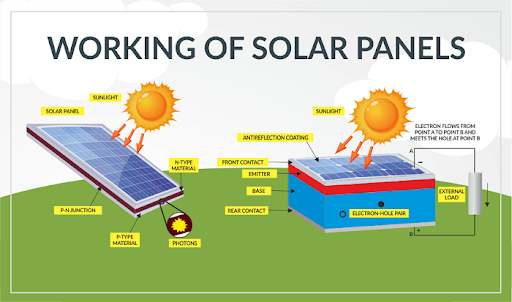
Types of Solar Panels
When choosing solar panels, you’ll come across three main types:
Monocrystalline Solar Panels
- Made from single-crystal silicon, making them the most efficient type.
- Occupies less space due to higher efficiency.
- Typically more expensive but offer better performance in low-light conditions.
Monocrystalline solar panels are renowned for their efficiency and sleek appearance. They are ideal when space is limited, but the budget allows for a higher initial investment.
Polycrystalline Solar Panels
- Made from multiple silicon crystals, making them slightly less efficient than monocrystalline panels.
- More cost-effective and widely available.
- Suitable for larger installations where space is not a constraint.
Polycrystalline solar panels are a practical choice for those looking to balance efficiency with affordability. They offer a good compromise between cost and performance.
Thin-Film Solar Panels
- Made from various materials like amorphous silicon or cadmium telluride.
- Less efficient but flexible, lightweight, and cheaper.
- Ideal for applications where aesthetics or flexibility is important.
Thin-film solar panels are versatile and can be integrated into various surfaces, such as building materials and even clothing. They are an excellent choice for unconventional solar panel installations.
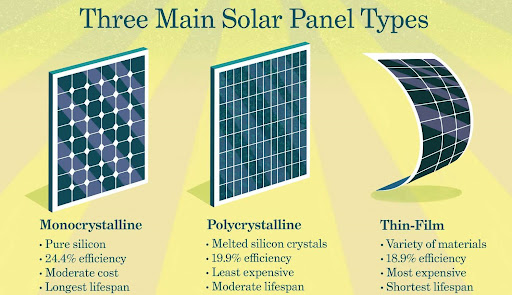
Efficiency and Power Output
Factors Affecting Solar Panel Efficiency
Solar panel efficiency is a critical factor to consider as it directly impacts the amount of electricity your system generates. Several factors affect efficiency:
- Quality of Materials: High-quality materials and manufacturing processes contribute to better efficiency. You can ensure good quality materials by choosing the best solar installation companies in your area.
- Temperature: Solar panels are less efficient at high temperatures.
- Shading: Even partial shading can significantly reduce efficiency.
- Orientation and Tilt: Proper orientation and tilt towards the sun optimize efficiency.
Calculating Power Output
To estimate a solar panel system’s power output, you need to consider factors like panel efficiency, local weather conditions, and the panel’s tilt and orientation. You can use online calculators or consult with a solar installer for a precise estimate.

Durability and Warranty
Material Quality
Choose solar panels with durable materials, as they will be exposed to various weather conditions for decades. High-quality panels are less likely to degrade over time and have a longer lifespan.
Warranty Period
Solar panels typically come with warranties ranging from 10 to 25 years. Longer warranties indicate the manufacturer’s confidence in their product’s durability. Consider this when making your selection.
Installation Considerations
Roof Compatibility
Before choosing solar panels, assess your roof’s condition and compatibility. Factors like roof age, orientation, shading, and structural integrity can impact your solar panel installation. An experienced installer can help you make this assessment and you can also check out our free complete guide on solar panel installation.
Installation Costs
Installation costs can vary based on factors like the complexity of the installation and location. Obtain multiple quotes from reputable installers to compare costs and choose the most cost-effective option.
Cost and Budgeting
Upfront Costs
Solar panel systems require an initial investment. Consider your budget and financing options, such as loans or leasing, to determine what you can afford upfront.

Long-Term Savings
While the initial cost may seem high, solar panels can lead to significant long-term savings through reduced electricity bills and potential incentives. Calculate the payback period to understand when your investment will break even.
Environmental Impact
Carbon Footprint
Solar panels are a clean energy source, significantly reducing your carbon footprint. The energy payback time, or the time it takes for a solar panel to produce the same amount of energy used in its production, is relatively short for most panels.
Recycling
When considering environmental impact, also think about end-of-life disposal. Most solar panels can be recycled, reducing their environmental footprint further.
Incentives and Rebates
Federal and State Incentives
Many governments offer incentives and rebates to promote solar energy adoption. Research federal and state programs to identify potential financial benefits for your solar panel installation.
Net Metering
Net metering allows you to sell excess electricity back to the grid, further reducing your energy costs. Check if your local utility offers net metering programs.
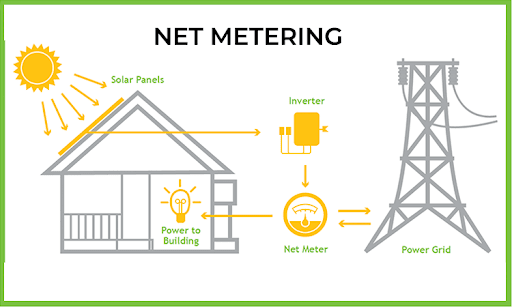
Maintenance and Cleaning
Regular Maintenance
Solar panels are low-maintenance, but periodic inspections ensure they function optimally. Monitoring systems can help you track their performance.
Cleaning Solar Panels
Dust, dirt, and debris can accumulate on solar panels, reducing their efficiency. Gently clean them with water and a soft brush or hire a professional for periodic cleaning.
Choosing the Right Solar Panels
Factors to Consider
When choosing the right solar panels, consider the following factors:
- Location: Consider your geographic location, climate, and available sunlight.
- Budget: Determine your budget and financing options.
- Space: Assess available roof or ground space for installation.
- Energy Needs: Calculate your energy needs to determine the system size.
- Quality: Choose high-quality panels from reputable manufacturers.
- Efficiency: Select the type of panel that best suits your efficiency needs.
- Warranty: Opt for panels with longer warranties for peace of mind.
- Installer: Hire a professional installer with experience and a good reputation.
Solar Panel Installation: Ground-Mounted vs. Rooftop Systems
When deciding to install solar panels, you must choose between ground-mounted and rooftop systems. Each option has its advantages and considerations:
Ground-Mounted Systems
- Optimal Placement: Ground-mounted systems can be placed in the optimal orientation and tilt for maximum sunlight exposure, potentially increasing energy generation.
- Space Requirements: They require available land or open space, making them suitable for larger properties or commercial installations.
- Maintenance: Cleaning and maintenance are typically easier since the panels are at ground level.
- Aesthetics: Some find ground-mounted systems less aesthetically appealing, although this can be subjective.
Rooftop Systems
- Space Utilization: Rooftop systems utilize existing space, making them ideal for homes or businesses with limited land.
- Aesthetics: They are less obtrusive and blend seamlessly with the building’s architecture, making them a popular choice for residential installations.
- Installation Costs: Rooftop installations can be more cost-effective due to the use of existing structures.
- Efficiency Challenges: The orientation and shading of the roof can impact efficiency. Professional assessments are crucial to optimize rooftop installations.
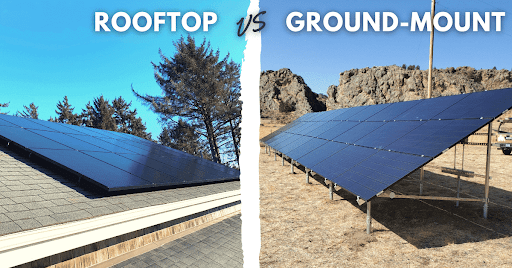
Consider your property size, energy needs, and aesthetic preferences when deciding between these two installation options. A thorough evaluation will help you determine which one suits your requirements best.
Emerging Solar Panel Technologies
The solar industry is continually evolving, and new technologies are emerging to improve the efficiency and sustainability of solar panels. Here are some exciting advancements to keep an eye on:
Bifacial Solar Panels
Bifacial solar panels can capture sunlight from both the front and rear sides, increasing energy generation. They are particularly effective in snowy or highly reflective environments.
Transparent Solar Panels
Transparent solar panels can be integrated into windows and glass surfaces, allowing buildings to generate electricity while maintaining natural light and aesthetics.
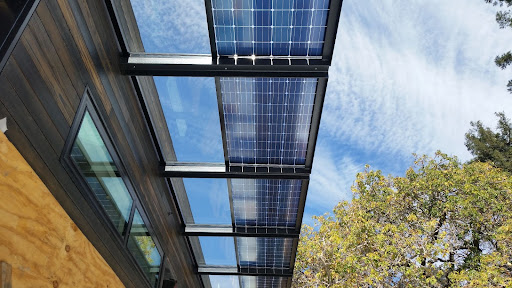
Solar Panels for Businesses: Benefits and Considerations
While residential solar panel installations are common, businesses can also benefit significantly from solar energy. Here are some key considerations for businesses considering solar panels:
Cost Savings
Solar panels can significantly reduce a business’s electricity bills, leading to substantial long-term cost savings. Additionally, businesses may qualify for various incentives and tax credits.
Brand Image and Sustainability
Investing in solar panels demonstrates a commitment to sustainability, which can enhance a business’s brand image and attract environmentally-conscious customers.
Scalability
Businesses can scale their solar panel installations to meet their energy needs. This flexibility allows companies to adapt to changing energy demands over time.
By considering these additional factors and staying informed about emerging technologies, you can make an even more informed decision when choosing the right solar panels for your home or business.
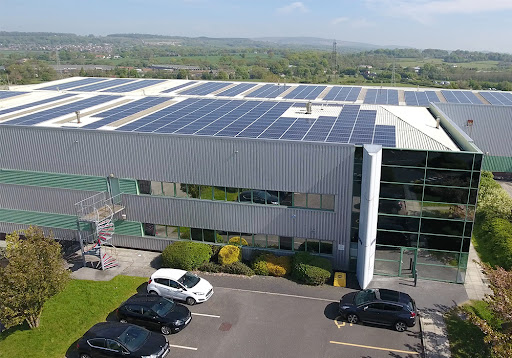
Solar Resource: Your Solar Technology Guide
When making the important decision of choosing the right solar panels, consider seeking guidance from experts in the field. Solar Resource, a leading solar technology guide, can provide valuable insights and recommendations to help you make an informed choice.
Incorporate their expertise into your decision-making process by visiting Solar Resource for up-to-date information and personalized assistance.
Conclusion
Choosing the right solar panels for your home or business is a significant decision that requires careful consideration of various factors. By understanding the types of solar panels, their efficiency, durability, costs, environmental impact, and available incentives, you can make an informed choice that aligns with your energy goals and budget. Remember to consult with experienced professionals and consider seeking guidance from web sources like Solar Resource for expert advice. Investing in solar panels is not just a financial decision; it’s a step towards a more sustainable and eco-friendly future. Embrace solar energy and take control of your energy future.
